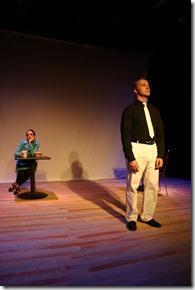
Dead Man’s Cell Phone
Written by Sarah Ruhl
Directed by Toma Tavares Langston
at Athenaeum Theatre, 2936 N. Southport (map)
thru July 27 | tickets: $20 | more info
Check for half-price tickets
Read review
Life as app in funny exploration of identity in the digital age
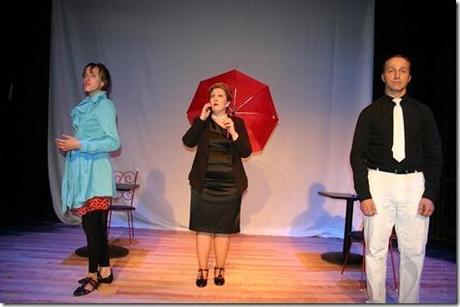
The Enthusiasts Theatre Company presents
Dead Man’s Cell Phone
Review by Joy Campbell
Jean (Erin Kelly Outson) is a woman sitting in a café when the ringing of a nearby patron’s cell phone interrupts her solitude. Frustrated at the imposition and the patron’s lack of response, she walks over only to discover that the patron (Gary Barth) is dead. By answering his phone and usurping its ownership, Jean assumes responsibility for the deceased’s life, and begins a path of inserting herself into his world, meeting his family and his mistress and, through well-intentioned deception, creating a history for herself and closure for them. Through Jean’s imagination, people and relationships are transformed through the completely fabricated last words of the dead man, Gordon.
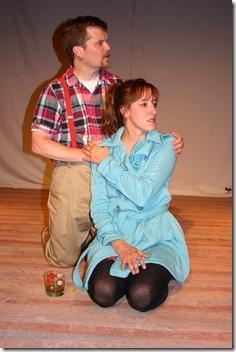
In contrast to the juggernaut of digital communication, Gordon’s brother, Dwight (Arne Saupe), runs a stationery shop. In a bit of strained metaphor, Dwight represents the permanence of communication and identity. His love for Jean must compete with her love for Gordon, with whom she has imbued all manner of virtue, made more intense by her belief that by answering his phone she is keeping his memory alive.
For its inaugural production, theater newcomer The Enthusiasts chose this quirky, charming play by award-winning local playwright Sarah Ruhl. The play attempts to create a Cartesian-esque “I answer therefore I am” metaphor for the cell phone’s evolution into personal identity. “If your phone is on,” Jean opines, “you’re supposed to be there.” However, as she also points out, “when everyone has them on, no one’s really there; it’s like we’re all disappearing.” The play is described as “a meditation on death, love, and connection in the digital age.” In a 2008 New Yorker interview, playwright Ruhl said “We’re less connected to the present. No one is where they are. There’s absolutely no reason to talk to a stranger anymore – you connect to people you already know. But how well do you know them? Because you never see them – you just talk to them. I find that terrifying.”
As a commentary on the isolation between people, the play is successful; however, it doesn’t make its case that digital communication is the culprit; people’s behavior and choices remain front and center. We all know countless anti-cell phone tropes: the person who can’t hang up even while placing an order at a restaurant; the people so addicted to texting that they miss what’s happening around them; the friend who answers their cell in the middle of your sentence. We know them. The problem is, Ruhl’s script doesn’t make a compelling argument that the existential isolation in the play is the result of the digital age. It seems to stem more from the dysfunctional relationships of the people in Gordon’s life, a man whose own ethics are highly questionable. It’s the people and their willingness to believe, not the technology, that drive the action.
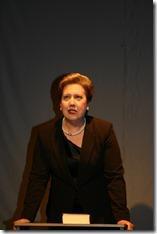
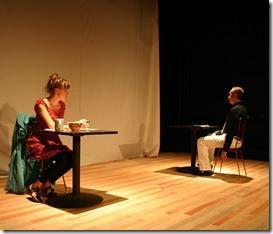
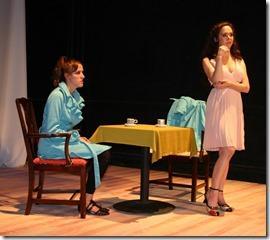
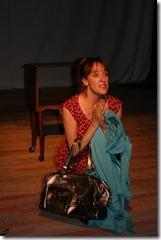
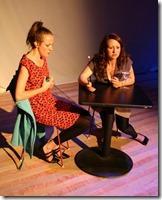

As the play progresses, the script gets lost and muddied in increasingly surreal scenes as it struggles for a resolution, and when it does end it seems like an afterthought. Also, at two hours with intermission, the show is too long. Much of this could be addressed by tightening lines, picking up the pace, and shortening scene changes.
All of this is ultimately forgivable, as the cast is charming and entertaining. As Jean, Outson has a talent for delivering Ruhl’s deliberately over-the-top lies with a campy deadpan earnestness that makes her both hilarious and endearing, and her physicality is terrific. Shelley Nixon is a standout as Gordon’s jaded, bitter widow Hermia, alternately comic and poignant, but always spot-on. As The Other Woman, Katherine Bellantone plays the Exotic Kept Woman to a T, making the act of applying lipstick worthy of a news release. Saupe plays Gordon’s brother Dwight with a sweet, simple earnestness that sets him apart from the family zoo, and Nancy Greco plays the flighty, overdramatic matriarch with gusto, although there is more room for her to break out into full Nora Desmond mode. As Gordon, Barth entertains while living or dead. His engaging monolog reveals much and gives us insight into a man who believes that “Morality can be measured by results.”
On opening night, the production was plagued with lighting problems that seemed to stem from a master house switch not properly shut off. The first half of the show was therefore done with no blackouts and several distracting attempts by the light crew to compensate. The problem seemed to be resolved at intermission however, and the lighting results were much more satisfying. The cast handled it all very well.
The set is minimal, with a few movable pieces, which work fine, but, there is not much for the audience to look at as the backdrop is a simple white sheet upon which backlit silhouettes are cast when offstage callers speak to Jean via Gordon’s phone. It’s rather clumsily done, and the result is not compelling. It would be nice to have the backdrop employed as a means of back-projecting a location, if just to give the stage more visual appeal.
All in all, as social commentary, Dead Man’s Cell Phone brings no epiphanies. As a fun night out, however, it succeeds.
Rating: ★★★
Dead Man’s Cell Phone continues through July 27th at Athenaeum Theatre, 2936 N. Southport (map), with performances Thursdays-Saturdays at 8pm, Sundays 3pm. Tickets are $20, and are available by phone (773-935-6875) or online through OvationTix.com (check for half-price tickets at Goldstar.com). More information at TheEnthusiastsTheatre.org. (Running time: 2 hours, includes an intermission)
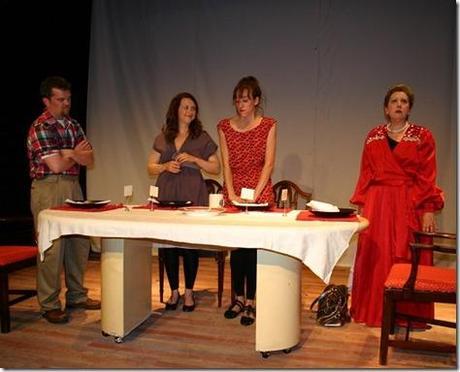
Photos by Victor E. Bvzeta
artists
cast
Erin Kelly Ouston (A Woman, Jean), Gary F. Barth (A Dead Man, Gordon), Nancy Greco (Gordon’s Mother, Mrs. Gottlieb), Shelley Nixon (Gordon’s Widow, Hermia), Arne Saupe (Gordon’s Brother, Dwight), Katherine Bellantone (The Other Woman, the Stranger)
behind the scenes
Toma Tavares Langston (director, producer), Claire Reinhart (assistant director), Paige Reilly (set and prop design), Raymond K. Cleveland (costume design and choreography), Emma Deane (lighting design), Andrew Sours (sound design), Caroline Brogan, Matthew Gillis (marketing team), Victor E. Bvzeta (photos)
14-0708

